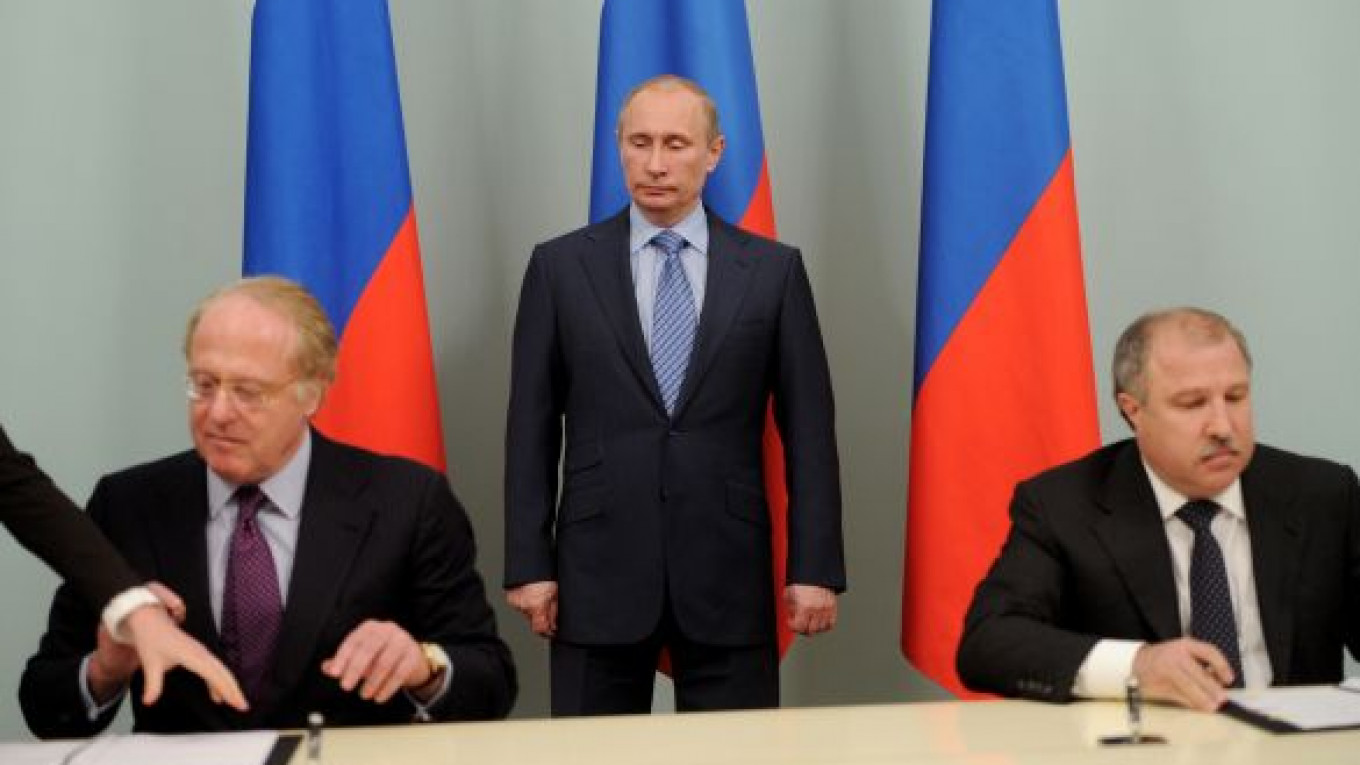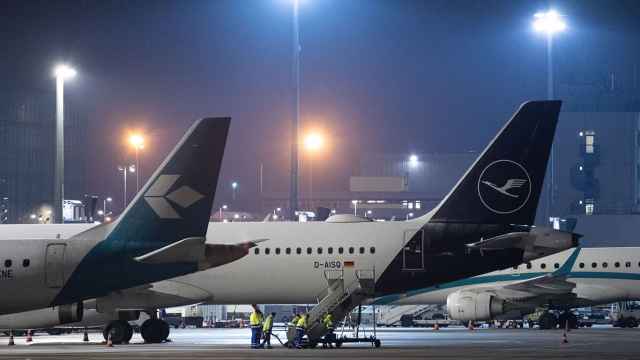Italian energy giant Eni and state-owned Rosneft signed an Arctic oil deal Wednesday under the watchful eye of Prime Minister Vladimir Putin that could lead to investment of up to $125 billion.
The terms announced by the two companies mirror those in an agreement between U.S. heavyweight ExxonMobil and Rosneft last year, and experts said the template was likely to be repeated again and again as international oil majors jostle to get access to Russia's offshore riches.
Eni head Paolo Scaroni hinted at the intensity of his company's activities in Russia during a meeting with President-elect Putin when he said he had visited the country 12 times since the beginning of the year.
"I meet more often with Mr. [Alexei] Miller [the head of Gazprom] than my own wife," he said, according to a transcript on the government's website.
A joint gas venture between Eni, Gazprom Neft and Novatek in the Yamal-Nenets autonomous district began production earlier this week. Eni also partners Gazprom in the South Stream project.
Head of Rosneft Eduard Khudainatov said Eni and ExxonMobil were just the beginning and that Rosneft has made proposals to domestic and foreign energy companies about cooperation in the Arctic.
"All our partners need to hurry," he said after the signing with Eni, energy news portal Energo-news.ru reported. "Watch us carefully, we have lots of work going on."
Some experts have heralded the opening up of Russia's Arctic resources to foreign companies as a sea change for investors and a new departure for Putin as he begins his third presidential term.
"This highlights a huge trend and huge interest in entering Russian offshore developments," said Vladimir Osakovsky, chief economist at Merrill Lynch in Russia. "The next political direction for Putin will be much more liberal and pro-business and much more reformist."
Putin assured Eni that he fully backs the deal. "The government of the Russian Federation will do all it can to support such projects," he told Scaroni.
High oil prices have placed the Kremlin in a good bargaining position in relation to international oil companies looking for access to new reserves — and particularly reserves as attractive as the hydrocarbon deposits beneath the country's northern waters, estimated at 100 billion tons of oil equivalent.
Under the agreement, Eni and Rosneft will set up joint ventures — with Eni holding a 33.33 percent stake in each — to exploit the Fyedynsky and Tsentralno-Barentsyevsky license blocks in the Barents Sea and the Zapadno-Chernomorsky license block in the Black Sea. The areas are estimated to contain 36 billion barrels of oil equivalent.
Rosneft will, in return, gain access to some of Eni's international projects. These could be in North Africa, the United States or Northern Europe, said Eni chief operating officer for exploration and production Claudio Descalzi, RIA-Novosti reported.
Joint investment in the Barents Sea blocks will be between $50 billion and $70 billion, and in the Black Sea between $50 billion and $55 billion, Khudainatov said, RIA-Novosti reported.
Exploration could cost up to $2 billion — an expense that will be largely shouldered by Eni.
"Russian companies can't develop the shelf on their own," said Konstantin Cherepanov, an oil analyst at UBS. "[They need] Western companies, their technology and their desire to work on the Arctic shelf and develop Russian resources."
Tax concessions of up to 15 years offered by the Russian government have been one of the deal-clinchers for foreign majors.
ExxonMobil chief executive Rex Tillerson said he was grateful to Putin for the tax incentives provided for his company's deal with Rosneft earlier this month during a meeting at Putin's Novo-Ogaryovo residence near Moscow.
Scaroni echoed the thanks Wednesday. "Nothing would have been possible if you had not taken action in relation to Russia's taxation system," he told Putin.
Osakovsky from Merrill Lynch described the tax changes as "close to revolutionary for Russia."
Rosneft's share price on MICEX rose 0.96 percent Thursday, slightly ahead of the index as a whole, which climbed 0.36 percent.
But analysts warned that the project was so long-term that there was unlikely to be any immediate impact on Rosneft's capitalization. Drilling in the Arctic will not begin until at least 2020, Khudainatov said.
And the long time frame also leaves the tie-up vulnerable to political risk. Energy giants ExxonMobil and Shell have suffered from political problems during Sakhalin projects in Russia's Far East. BP's $16 billion Arctic deal with Rosneft collapsed in acrimony last year.
Those with longer memories even recall the difficulties Eni ran into during its own partnership with Gazprom seeking to exploit reserves in southern Russia near Astrakhan more than a decade ago.
"All these projects are very expensive and very long-term," said Valery Nesterov, an oil analyst at Troika Dialog. "To say everything will be the same in 10 years' time isn't sensible."
A Message from The Moscow Times:
Dear readers,
We are facing unprecedented challenges. Russia's Prosecutor General's Office has designated The Moscow Times as an "undesirable" organization, criminalizing our work and putting our staff at risk of prosecution. This follows our earlier unjust labeling as a "foreign agent."
These actions are direct attempts to silence independent journalism in Russia. The authorities claim our work "discredits the decisions of the Russian leadership." We see things differently: we strive to provide accurate, unbiased reporting on Russia.
We, the journalists of The Moscow Times, refuse to be silenced. But to continue our work, we need your help.
Your support, no matter how small, makes a world of difference. If you can, please support us monthly starting from just $2. It's quick to set up, and every contribution makes a significant impact.
By supporting The Moscow Times, you're defending open, independent journalism in the face of repression. Thank you for standing with us.
Remind me later.







